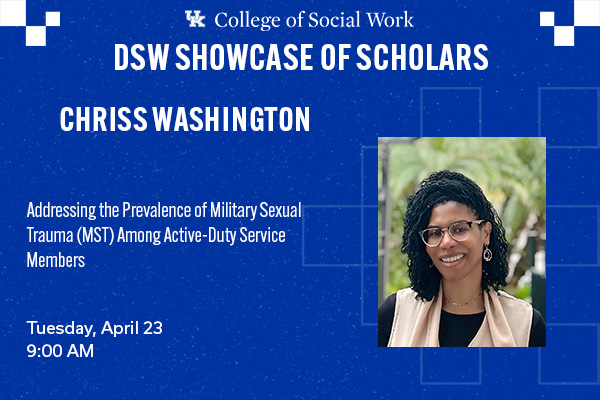DSW Candidate – Chriss Washington, 9AM – 10:15AM
$0.00
Virtual Showcase of DSW Scholars 2024 Event!
Addressing the Prevalence of Military Sexual Trauma (MST) Among Active-Duty Service Members
DSW Candidate – Chriss Washington
Tuesday, April 23, 2024
9AM – 10:15AM Eastern Time Zone
Credit Hours: 1.0
Description
Addressing the Prevalence of Military Sexual Trauma (MST) Among Active-Duty Service Members
This capstone presentation will explore the prevalence of Military Sexual Trauma (MST) among active-duty service members. MST is classified as sexual assault and/or sexual harassment that occurred while a service member was in the military. MST is a trauma that is overlooked in the military across all branches.
Unresolved MST impacts thousands of service members, which can lead to a cycle of depression, PTSD, and a variety of other mental health disorders. In essence, service members defend America, but who is defending them while they are on active duty? Why are the rates so high and what is done when it occurs?
What safeguards are in place to stop MST from happening? Has military culture and socialization produced a negative environment that, in essence, does not offer safety and support to MST? The following questions will display why a shift in military culture is needed to combat MST.
There are several barriers that add to the prevalence of MST. The barriers include lack of options to report sexual assault, fear of retaliation, rank, gender/sex, ethnicity, and command locations. MST is not recognized as a diagnosis, but it can have an impact on service members’ overall health and quality of life.
The prevalence of MST can be reduced once ALL service members have access to quality mental health treatment and lack of barriers to feel safe to report.
Learning Objectives:
- Describe the extent and prevalence of Military Sexual Trauma (MST) among active-duty service members.
- Determine the barriers that might deter service members from reporting MST incidents.
- Identify interventions to decrease MST.
Delivery Method: Live Interactive Training via Zoom Video Conferencing
Credit Hours: 1.0 (ACE)
Target Audience: This conference is intended for social workers and students.
Accreditation: University of Kentucky College of Social Work, Provider # 1377, is approved as an ACE provider to offer social work continuing education by the Association of Social Work Boards (ASWB) Approved Continuing Education (ACE) program. Regulatory boards are the final authority on courses accepted for continuing education credit. ACE provider approval period: 9/29/22-9/29/25. Social workers participating in this conference will receive up to 15 general continuing education credits.
Claiming CE Credit: Instructions for claiming CE credit will be disseminated at the beginning of each session.
Questions: If you have any questions regarding CE credit or to report a grievance, please contact Melissa Whitaker at melissa.whitaker@uky.edu. For technical assistance, please contact lmshelp@uky.edu.
